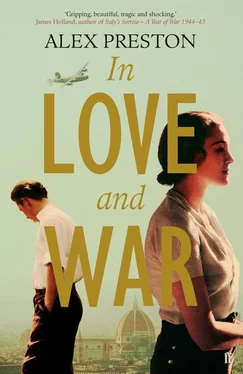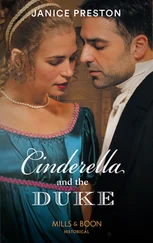‘I’m going to go down and see what’s going on.’
She takes his hand, fixing her eyes on his. ‘I’m coming with you,’ she says.
There’s an old bicycle in one of the sheds beside the villa. He hunts around for a pump, inflates the tyres and bangs dust from the saddle. Ada perches, nerveless and serene, on the handlebars as they wobble through the darkening lanes. Esmond is aware of the preciousness of his cargo, but is unable to stop himself pedalling when, at one point, they come round a corner and a blast of wind hits them and the searchlights and fireworks and cheering crowds spread out before them.
The bridge is thick with people. They get off the bike and push it across, murmuring scusi every so often. The whole world is smiling, children play, young couples stand arm-in-arm and look over the river. At the dam downstream, a group of boys have gathered to set off fireworks. These rise into the air and burst, shedding bright fragments that scatter their reflection over the Arno and then fall as ashes on the water.
They reach the Piazza della Signoria and chain the bike to the Loggia dei Lanzi. A stage has been set up in front of the Palazzo Vecchio. Michelangelo’s David , now free of his wooden carapace, looks pointedly in the opposite direction. Esmond can see the Professor and Bruno and a group of other men he recognises from those early days at Ada’s apartment. They are arguing, gesturing furiously at each other as a harried-looking engineer rigs up a microphone and tests the Tannoy system — uno due, uno due — which once carried Mussolini’s speeches to the perfect centre of the human world. Esmond thinks of Florence’s future: after throwing off the Fascists, the city will lose itself in petty political squabbles of the sort that is currently, publicly, taking place by the side of the stage. Finally, after glaring threateningly at an older man with a shiny head and round glasses, the Professor makes his way to the microphone.
‘In 1922,’ he begins, and a sudden hush falls across the piazza. Some are climbing up the monuments to secure a view of the stage. ‘In 1922,’ he repeats, ‘we made Benito Mussolini a freeman of the city of Florence. Today, we celebrate his captivity! Fascism in Italy is dead, the MVSN is dead. Today, black shirts will be hung at the back of cupboards, buried in sacks in the garden, burnt on a thousand bonfires.’ A huge cheer goes up, hats are thrown in the air; Esmond thinks of his own British Union uniform, moth-eaten and dusty, abandoned with his room in the church. He takes Ada in his arms and kisses her. ‘We have lived a nightmare,’ the Professor continues, ‘and now we are waking up. This is not the end, but it is the beginning of the end. Our sons are not yet home, our land is not yet our own, this war is not yet over. But soon, soon! Viva Firenze! ’
At the heart of the crowd, fist raised, one eye closed by a bruise, is Maria Luigia. She smiles towards them, as if letting them in on the secret of her survival. There are more fireworks, some girls have torn up their ration cards and are throwing them in the air like confetti. Esmond and Ada go to stand beside Maria Luigia’s broadness and lift their own fists into the hopeful air. ‘ Viva Firenze! ’
The next day they walk into town together after breakfast. Bad weather came in overnight and a light rain is falling as they wind along the narrow lanes. The city is vague under a canopy of low cloud, the river yellow-grey and fast as they cross the Ponte Santa Trinità. They make their way past David into the Palazzo Vecchio. There is a swell of noise as they find the ornate main corridor; they follow the voices up a flight of stone steps and into a long, frescoed hall. People are standing and making speeches around a table, but most of the words are lost under the applause and clinking glasses and conversation. Esmond takes Ada by the hand and they cross the room to stand next to Tosca and Antonio in the bay of a window.
Bruno, stubble-shadowed, matchstick in mouth, sits between the Professor and a young, bespectacled man in a red cravat. Further up the table, Esmond sees the portly Oreste Ristori, a half-empty bottle of wine in front of him. He is leaning back and bellowing with laughter at something someone has said, his wide face rippling with each guffaw. Esmond sees the cyclist Gino Bartali, sitting next to his wife, grinning broadly and signing the occasional autograph. The Professor stands up and at once there is silence.
‘Welcome, all of you.’ He smiles, his watery eyes resting for a moment on the man beside Bruno. ‘Whatever our divisions — and we are certainly from different worlds, some of us — that which binds us is stronger. A certainty that we are moving into a new and vital age for our nation, for our city; a love of Florence and our fellow Florentines; a hatred of the thugs and monsters who have ruled us for twenty-one years. Today we welcome back some old friends, freed from needless captivity. We welcome Elio Chianesi’ — the man next to Bruno, with his studious round glasses, half-rises and waves — ‘once a student of mine. He has, for too long, been relying on the books we could smuggle into prison to nourish him. We missed you, Elio. We’re delighted to have you back.’
‘Thank you, Professor,’ he says, his pale cheeks flushing. Another round of applause, which stops suddenly as a young black man in an oyster-white linen suit comes barrelling into the room. He has a wild brush of wiry hair on his head, narrow, oriental eyes. Ada lets out a gasp.
‘Alessandro,’ she says. Leaving Esmond, she moves swiftly across the room to where the young man is already being embraced by Bruno, slapped on the back by the Professor, touched and poked by others. One of the ornate chairs is pulled out and he sits down as a glass of wine is poured. He lifts it to Elio and then turns to see Ada standing behind his chair, looking down at him with widening eyes. Esmond doesn’t hear what they say to each other, but he thinks he understands what is passing between them. The man’s skin is the same colour as the polished mahogany table, his eyes as black as the wine in his glass. Esmond finds himself feeling — not jealousy — but a sleepy melancholy, until he sees Ada, now smiling, gesture towards him and say something to the young man. With a gentle pat on the man’s shoulder, Ada makes her way back to his side.
They don’t speak until after the meeting is over, and the various liberalsocialiste — anarchists, Communists, Christian Democrats and Republicans — stand around drinking up the wine liberated — as Bruno puts it — from the now boarded-up Fascist headquarters at the Piazza Mentana. He and Ada are still at the window, looking out over the elevated cloisters of the Uffizi. The rain is heavier now, the only people moving by the river are hidden by the black domes of their umbrellas.
‘An old flame?’ he asks, trying to sound light-hearted.
‘His name is Alessandro Sinigaglia. His father was a friend of my father’s. He’s been in Regina Coeli for a long time. I hardly recognise him.’
‘Is he Abyssinian? He’s extraordinary-looking.’
‘His father’s Jewish, his mother was the black maid of a family from St Louis who came here just before the first war. She was thrown out when they found out she was pregnant and she made Florence her home.’
He turns to look across the table to where Alessandro, Elio and Bruno are talking. They toast each other, drink, recharge their glasses. They seem bold and worldly, in a way he knows he isn’t. He lets out a sigh. Ada takes his hand and gives it a squeeze, speaking softly.
‘I love you. I know I don’t say it very often — it’s not my way. But I always dreamed of this, of you.’ She squeezes his hand again, harder this time. ‘I told him he could stay with us, just until he finds a place. You don’t mind, do you?’
Читать дальше












